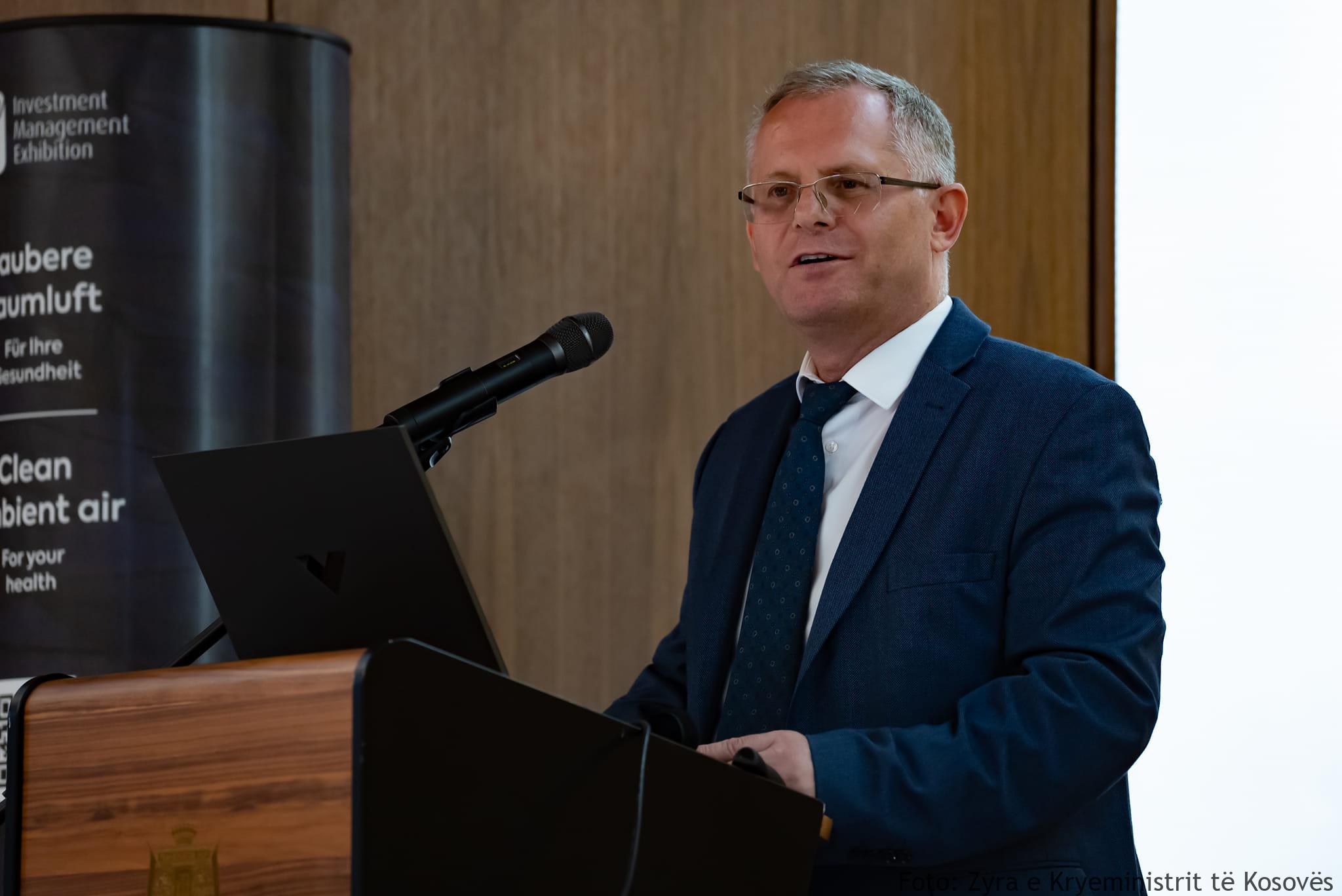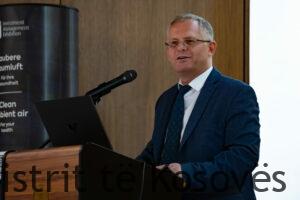The first Deputy Prime Minister for European Integration, Development and Dialogue, Besnik Bislimi, has conducted an interview with Investment Monitor, on the sidelines of the “Investment Management Exhibition” event, during September. The full article is below:
In conversation with: Deputy Prime Minister of Kosovo, Besnik Bislimi
Besnik Bislimi, Deputy Prime Minister of Kosovo, says his government is writing a new story on investment in the country.
By Jon Whiteaker
Besnik Bislimi, Deputy Prime Minister of Kosovo, was in Frankfurt, Germany in September to promote investment opportunities in his country.
Situated in the heart of the Balkans, Kosovo only became a state in 2008 when it unilaterally declared independence from Serbia. It is still only partially recognised internationally, with five out of 27 UN members and eight of the G20 still not recognising the country.
This limbo existence, as well as the legacy of the Yugoslav wars and political instability, have stymied the country’s economic progress, but when Investment Monitor caught up with Bislimi on the sidelines of the Investment Management Exhibition event in Frankfurt he argued that Kosovo’s new government is writing a new story of opportunity.
“We are trying to convince all potential investors that are currently looking for new markets, new options, are relocating from East Asia, or Russia, that the narrative of a country with tensions, insufficient market size, and insufficient purchasing power, is a story of the past,” says Bislimi.
There have certainly been more positive economic indicators for Kosovo in recent years. World Bank data shows net inflows of foreign direct investment (FDI) into the country have been on an upward curve since 2016 and reached just under $400m in 2020. This remains low internationally, however, and far below near neighbours such as Montenegro ($531m) and Albania ($1bn).
Bislimi believes the economic reforms his government is undertaking will see further FDI growth, as international investors start to recognise the opportunities Kosovo has to offer.
“The new story is of a well-established democracy that puts an emphasis on the rule of law and economic growth”, he says. “A vibrant country with about 70% of the population under the age of 35.”
A crackdown on corruption in Kosovo
Bislimi is an economist and academic who first elected to the Kosovo parliament in 2014 as part of the Vetëvendosje political party. He served as Finance Minister under the first, short-lived administration headed by Albin Kurti in 2020. When Kurti returned as Prime Minister in 2021, Bislimi was appointed Deputy Prime Minister.
Bislimi is keen to emphasise the reforming agenda of the Kurti government and points to several economic and social indicators that bode well for the future of Kosovo.
Kosovo’s 10.5% preliminary GDP growth rate for 2021 was higher than any other country in Europe, and during the first quarter of 2022 it rose 4.6%, which Bislimi says is the fastest growth in the western Balkans.
The World Bank says that this robust recent economic growth has primarily been due to a rise in private consumption and an increase in exports. It also notes that private investment in Kosovo was spurred by higher private real estate FDI.
Bislimi highlights the government’s effort to formalise Kosovo’s economy, and the progress made on reducing corruption. Transparency International ranked Kosovo 87th out of 180 countries for corruption in 2021, which was an improvement of 17 places compared to the previous year. Transparency International says Kosovo has shown “genuine will to fight corruption” in recent years, highlighting investigations into potentially corrupt leaders and the adoption of a strategy on the rule of law.
While investors can take comfort from this improvement in governance and transparency, they may also be lured by the country’s attractive tax regime.
Kosovo has a 10% corporate income tax, no taxes on dividends and gives companies the ability to fully repatriate profits. The country already has comparatively low income tax rates and the government is pushing forward with a plan to completely exempt personal income taxes for the minimum wage, which is it also increasing.
“What we offer that is different from almost all countries in the region is that businesses that invest in Kosovo will have zero exchange rate risks since we use the euro,” says Bislimi.
The contested legality of Kosovo as a country will remain a concern for investors in all of these sectors, particularly at a time when there is war in Europe. Yet there has been some progress on this front too.
While Serbia still does not recognise Kosovo as a sovereign state, in 2020 the two countries normalised economic ties.
Investment opportunities in Kosovo
According to Bislimi, Kosovo is ideally placed to benefit from trends such as capital flight from Russia due to the war in Ukraine and nearshoring in Europe, due to high number of sectors with the ability to grow and its young workforce.
Bislimi says that youth is the most important asset that Kosovo has and the government’s focus is to concentrate its efforts on those sectors that “guarantee the highest possible return” for younger people in society.
“We have observed over the past 10 years an ever-increasing interest from foreign companies to outsource or nearshore part of their production process to Kosovo, especially in the sectors of IT, website design, customer care, HR management, business-to-business processing, and also cybersecurity and blockchain,” he adds.
Bislimi says there is growing interest from the food processing industry, the metal processing industry and energy transition companies. Kosovo has just 140 megawatts of installed wind power and 35 megawatts of hydropower capacity, but the government is targeting an installed capacity of two gigawatts of renewables.
“I think Europe-wide we have a very competitive number of sunny hours annually, and we have identified several areas that can provide good potential for generating wind power,” says Bislimi.
Kosovo has just signed a contract with the Millennium Challenge Corporation of the US for a contract to build 350 megawatts of battery power capacity into the country, and Bislimi says the government is very keen to find investors who can further improve the balance of energy supply in the country.
Privatisations in Kosovo slowed, not cancelled
An area of the Kosovo economy that has attracted investor interest in recent years has been its state-owned enterprises and efforts to privatise them. It is the last country in Eastern Europe yet to complete a large-scale privatisation of its state-owned assets, which is seen as vital to the country becoming a full market economy.
Yet in May 2021 members of Kosovo’s parliament voted to dismiss the board of the Privatisation Agency of Kosovo, which had overseen privatisation efforts for almost 20 years.
At the time Kurti told journalists that “good things might come slowly but bad things should be stopped as quickly as possible”.
Bislimi says that previous waves of privatisations in Kosovo “did not follow any vision of goals”, such as reducing unemployment, increasing FDI, or improving the efficiency of the companies for sale.
“What happened is that after privatisations, unemployment increased and companies converted assets from production to the service sector or even construction sector asset,” says Bislimi.
“The new government will change the narrative of the privatisation process, to first strengthen the capacity of the companies, make then competitive, so that when we privatise them, we only attract serious investors that have a goal of further expanding their capacities.”
Kosovo has 17 state-owned enterprises, in sectors such as energy, water and telecoms. Bislimi says only three are not operating at a loss, and he claims excessive employment has been a chronic problem in the country’s public sector.
Bislimi points to Kosovo Telecom, which has previously been put out to privatisation tender. He says that within just a few months, the new government has reduced the company’s headcount by 300 (or 12.5% of the total) through the offer of severance payments, and now “for the first time in many years Kosovo Telecom is operating at a profit”.
He adds that the government is making a distinction between state-owned and socially owned assets. The priority is to make each profitable before deciding whether to privatise, and the government is establishing a sovereign fund for those assets that are not sold to sit in.
The image that the government is trying to project is one of patience and competence, rather than rushing to cash in on state assets. But Bislimi is clear that foreign investors are more than welcome in Kosovo and he hopes the reforms and economic performance of recent years may be enough to entice them.



